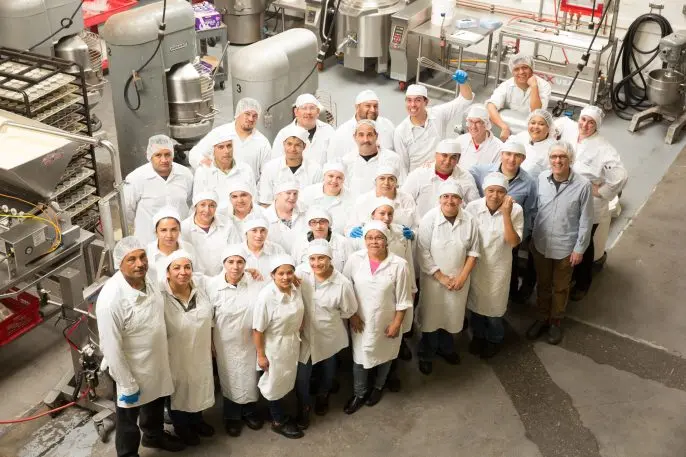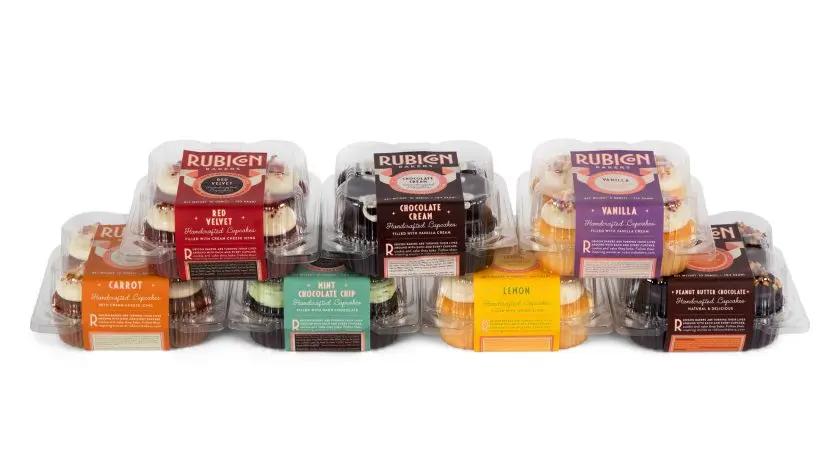Deantee James spent around a year looking for a job before finding his current position as a baker in Richmond, California. “I was putting in applications and nothing was coming through,” he says. James has a criminal record, which makes it more difficult to find work; one study found that black men with a record only got called back for an interview 5% of the time. But Rubicon Bakers, where James now works, was deliberately designed to give people a second chance.
The bakery first launched as a job training program for a nonprofit more than 25 years ago, aimed at helping people with histories of addiction, homelessness, or incarceration find work. Now it’s a quickly growing business, with products in more than 2,500 stores. Over the last year, the number of employees nearly doubled.
CEO Andrew Stoloff learned about the bakery a decade ago at a time when it was struggling financially. Stoloff, a successful restaurateur, gave some advice, and when the nonprofit decided to sell the bakery, helped them try to find a buyer–but no one wanted it.

He decided to convert it into a for-profit. “Through the year that I had reviewed the financials and had spent some time at the bakery, I saw some opportunities to really turn the business around and make it a more nimble kind of business,” he says. “I think that would have been much harder to do as a nonprofit.” He trimmed costs in ingredients and other supplies, but promised not to cut jobs. And the bakery’s business began to grow.

Unlike some other businesses–like a startup grilled cheese restaurant that only hires employees with a criminal record–Rubicon Bakers is open to anyone, not only those with a difficult past. (It also conducts interviews, unlike a similar bakery on the East Coast that employees people with more complicated job histories by simply hiring anyone who applies.) Rubicon works with nonprofit partners to connect with potential employees who are struggling to find jobs elsewhere. It also offers more flexibility than a typical employer might when someone has to unexpectedly miss work.

The company also offers employees no-interest loans. “At the end of our block there’s a check cashing store, and when we first bought the bakery, I would see people walk down the street, go to the check cashing store, take out a $150 loan, and then struggle over the next two or three or four months paying back multiples of that,” says Stoloff. Someone might pay the check cashing store $300 or $400 on the original loan of $150. “It kind of made my stomach churn to see people being taken advantage of in that way.” The loans Rubicon offers are typically small, but meaningful for employees who start at minimum wage. In Richmond, this will be $15 a hour starting in January; over time, employees can progress to higher-paid managerial roles. Since the business launched, the company has given out roughly $500,000 in loans. The payback rate is high, Stoloff says, despite employees’ poor credit scores.
Stoloff argues that more companies should take a similar approach to hiring. “Strictly looking at it from a business perspective, it makes sense,” he says. “I didn’t understand this going into this, but throughout the years I’ve seen it over and over again that by taking in an employee who needs that second chance and who has found it very difficult to find employment, we wind up with a very grateful employee. Not only that, but an employee who is focused on the job for a very different set of reasons: Of course they’re working like everybody else because they need a paycheck, but they’re also working to prove to themselves, to prove to their family and friends, that they can turn their life around and take advantage of that second chance. So we get employees who are much more directed and dedicated, and we find that they stick around longer.”
Most employees start with no experience, and Rubicon Bakers invests heavily in training. “It’s very expensive for us to lose an employee,” he says. “But our retention is much, much higher than it is in our industry as a whole. So we’re a huge beneficiary of providing that second chance.”
Recognize your brand’s excellence by applying to this year’s Brands That Matter Awards before the early-rate deadline, May 3.
